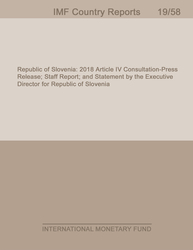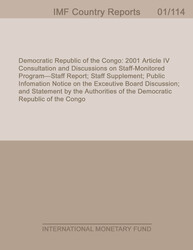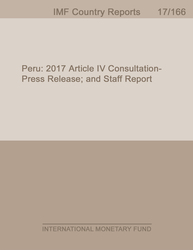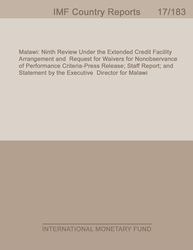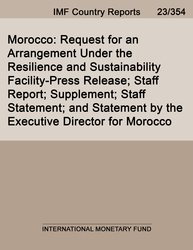
Morocco: Request for an Arrangement Under the Resilience and Sustainability Facility-Press Release; Staff Report; Supplement; Staff Statement; and Statement by the Executive Director for Morocco
Morocco: Request for an Arrangement Under the Resilience and Sustainability Facility-Press Release; Staff Report; Supplement; Staff Statement; and Statement by the Executive Director for Morocco
READ MORE...
Volume/Issue:
Volume 2023
Issue 354
Publication date: October 2023
ISBN: 9798400254963
$20.00
Add to Cart by clicking price of the language and format you'd like to purchase
Available Languages and Formats
| English | |||
| French |
Prices in red indicate formats that are not yet available but are forthcoming.
Topics covered in this book
This title contains information about the following subjects.
Click on a subject if you would like to see other titles with the same subjects.
Inflation , Money and Monetary Policy , International - Economics , Environmental Economics , Environmental Conservation and Protection , Natural Disasters , food inflation , CPI headline inflation , staff appraisal , RSF arrangement , RSF review , Climate change , Natural disasters , Greenhouse gas emissions , Climate finance , Global , Maghreb
Also of interest
Summary
Climate change is both a major threat and a source of opportunities for Morocco’s development. On one hand, Morocco is one of the world’s most water-stressed countries, and water scarcity is a serious constraint to the country’s ambition to transition to a new model of development. The authorities are planning to boost investment in water infrastructure, but this should be complemented by demand management reforms that bring the price of water closer to its actual cost and induce a shift in consumption behavior. On the other hand, Morocco can take advantage of its abundant competitive renewable energy resources to reduce its still high dependence on fossil fuels. Decarbonizing the energy matrix would require significant investments in renewable energy, which should be largely shouldered by the private sector. It would also require deep regulatory reforms, including further efforts to liberalize the electricity sector. Fully exploiting this renewable energy potential could reduce Morocco´s reliance on imported fuels, help Moroccan firms’ competitiveness in neighboring markets that are embracing a green energy transition (most notably the European Union), and help create jobs. The strong earthquake that hit Morocco on September 8, exerting a heavy toll in terms of human lives and physical damages, highlights the importance of strengthening the country’s preparedness and resilience to natural disasters, including from climate change.
